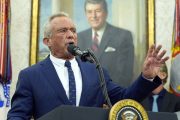
The Food and Drug Administration’s (FDA) independent vaccine committee has decided it is too early to throw its support behind a blanket authorization for booster doses of Pfizer’s COVID shot to people 16 and older, and voted against recommending it to the general public. The panel, however, said the at-risk groups, as well as people older than 65 may benefit from the third dose.
The Vaccines and Related Biological Products Advisory Committee, which reviews and evaluates data concerning the safety, effectiveness, and appropriate use of vaccines, met on Friday (see full video here) and heard arguments from scientists and Pfizer representatives in favor of authorizing a booster shot of COVID vaccine for those who have already received two doses of the jab.
In documents made public by the FDA before the meeting, Pfizer made the case its vaccines are only effective for half a year, and then a recipient should get a booster to refresh the protection. To support the claim, Pfizer cited a study from healthcare company Kaiser Permanente that showed that protection against COVID dropped from 88 percent in the first month after receiving the second dose to 47 percent after five months.
Pfizer also referred to Israel’s experience introducing the third dose of the jab to all eligible cohorts, which has already shown the booster restoring a 95-percent protection against COVID outcomes and reducing the number of breakthrough infections. The data was collected for just two months — from July 1 through Aug. 30 — when the Delta variant was surging throughout the heavily vaccinated country. This rather short period of study suggests the durability of the immune response generated by the boosters is yet to be evaluated.
Representatives from Israel’s Health Ministry, who were invited to the hearings to share the preliminary conclusions on their experience, strongly suggested the boosters are great, even though they are not yet fully studied. They admitted that even though the ministry did not have much data on the third dose, at least for a short-term, it helped to reduce the rate of COVID hospitalizations in a situation of a staggering number of fully vaccinated people becoming “critically ill” with COVID.
After several hours of deliberation, the panel voted 16-2 against approving the third dose before voting 18-0 in approval for older Americans and those considered at a higher risk of developing complications from the virus. That at-risk group includes people with diabetes, heart disease, obesity, and other comorbidities. The recommended additional shot is Comirnaty, which got full FDA approval on August 23 and which is not yet available in the U.S.
Dr. Michael Carome, director of Public Citizen’s Health Research Group, said at the meeting that there is a lack of data on effectiveness and duration of the boosters, while adding that “current evidence does not appear to show a need for boosting.”
Dr. Hayley Gans, a member of the committee and a pediatrician, indicated some of the data presented by Pfizer, including on safety of the boosters, was “insufficient.”
Dr. Paul Offit, also a pediatrician, said he could not be recommending third shots for younger cohorts due to a high risk of myocarditis, but would support boosters for people over 60, who have been shown not to develop such side effect, but are more susceptible to catching COVID.
In a paper published in the British medical journal The Lancet a couple of days before the advisory committee meeting, an international group of renowned scientists argued that widely distributing booster shots to the general public is not appropriate at this time. The authors, including two high-ranking FDA vaccines regulators who recently resigned from their positions over the aggressive political pressure from the Biden administration to speed up the approval of the boosters, said that the available data showed vaccine protection against severe disease persists, even as the effectiveness against mild disease wanes over time.
According to the paper, the benefits of primary COVID vaccination outweigh the risks, but when it comes to boosters, there are just too many unknowns.
While the FDA is not bound to follow the recommendation of the advisory panel, it has followed its guidance so far on COVID vaccinations. Still, Dr. Peter Marks, the director of the Center for Biologics Evaluation and Research at the FDA, reportedly said at the committee’s meeting, “We are not bound at FDA by your vote, just so you understand that. We can tweak this as need be.” Dr. Marks did not specify what specific “need” could make the FDA want to “tweak” the advice of its independent panel. Further, he asked the group for recommendations on what other populations the FDA should consider for boosters, such as front-line workers who may face exposure to COVID.
While still not final, the move represents a powerful rebuke of the Biden administration’s seemingly premature plan to administer booster doses to all Americans over 16 beginning September 20.
President Biden’s chief medical advisor, Dr. Anthony Fauci, a strong proponent of the boosters, has reportedly admitted that there actually was no particular study or a concrete piece of data that led the Biden COVID response team to determine that boosting was necessary. Rather, the Biden team relied on the “accumulation of multiple lines of evidence that persuaded them, including studies suggesting the protection offered by the original vaccines waned over time,” per the report.
The president’s plan specifies that the rollout would be pending final FDA evaluation and recommendations from the Centers for Disease Control and Prevention’s (CDC’s) Advisory Committee on Immunization Practices (ACIP). The administration has repeatedly stressed it would “follow the science” and “listen to the experts’ recommendations.”
According to the Associated Press, it is likely it would take the FDA a few days to consider the group’s advice and make its own decision.





